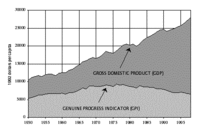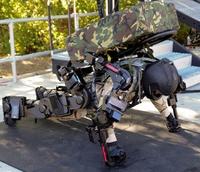-
Building a lie detector for social media

In our digital age, rumors — both true and false — spread fast, often with far-reaching consequences. The ability quickly to verify information spread on the Internet and track its provenance would enable governments, emergency services, health agencies, and the private sector to respond more effectively.
-
-
Identifying, thwarting insider threats before they do damage
Researchers argue that one way to identify and predict potential insider threats even before these individuals begin to do damage like stealing and leaking sensitive information, is by using Big Data to monitor changes in behavior patterns. Researchers at PARC, for example, found that individuals who exhibit sudden decrease in participation in group activity, whether in a game like World of Warcraft or corporate e-mail communications, are likely to withdraw from the organization. A withdrawal represents dissatisfaction with the organization, a common trait of individuals who are likely to engage in insider security breaches.
-
-
Wal-Mart effect: Decline in crime rates slower where Wal-Mart builds

Communities across the United States experienced an unprecedented decline in crime in the 1990s. For counties where Wal-Mart built stores, however, the decline was not nearly as dramatic. A new study examines crime rate in 3,109 U.S. counties in the 1990s, a time of dynamic growth and expansion for Wal-Mart and falling crime rates nationally. During that decade, Wal-Mart expanded in 767 of those counties. The researchers show that Wal-Mart tended to expand in counties with higher than average crime rates, and with numerous crime-related predicators, such as poverty, unemployment, immigration, population structure, and residential turnover. The researchers speculate that much of this relationship occurred because Wal-Mart finds better success building in communities that are less likely to protest the company’s arrival.
-
-
"Envy-free” algorithm may help in settling disputes
Whether it is season tickets to Green Bay Packers’ games or silver place settings, divorce and inheritance have bred protracted disputes over the assignment of belongings. Now, a trio of researchers has found a method for resolving such conflicts in an envy-free way. The envy-free algorithm may be used by negotiators in intractable political or territorial disputes. “The problem of fairly dividing a divisible good, such as cake or land, between two people probably goes back to the dawn of civilization,” write the authors.
-
-
Restrictive concealed weapons laws correlated with an increase in gun-related murders

It may make sense to assume that states in which there are tight laws on weapons would make that state a safer place and one with less gun crime, but recent research argues that the very opposite is true. Research shows that in states with more restrictive concealed carry weapons (CCW) laws there is actually an increase in gun related crime. The author notes that his study looks solely at gun crime, rather than violent crime, which is the case in similar research.
-
-
TV audiences often do not care about suffering in other countries
Television audiences care less about suffering experienced by people in other countries when they watch the news than when they watch a range of different programs, according to new research. New research finds that study participants were in many cases indifferent to what they saw and relieved that it did not affect them, especially the younger and male viewers. There were instances, however, mostly among older and female participants, of particularly emotional responses to suffering.
-
-
Time to replace GDP with new metrics: experts

Gross Domestic Product is a misleading measure of national success, say public policy experts. “When it was instituted seven decades ago, GDP was a relevant signpost of progress,” they say. “Increased economic activity was credited with providing employment, income and amenities to reduce social conflict and prevent another world war. But the world today is very different compared to how it was then.”
-
-
Bringing anthropological insights to bear on cybersecurity
Michael Polanyi (1891-1976), in his book Personal Knowledge, rejected the British Empiricists’ notion that experience can be reduced to sense data, and Alan Turing’s assertion that human minds are reducible to collections of rules. Rather, Polanyi said, it is tacit awareness — he later called it the “structure of tacit knowing”— which connects us, albeit fallibly, with reality. It provides us with the context within which our words and actions have meaning. Princeton’s anthropologist Clifford Geertz (1926-2006), in his The Interpretation of Cultures, built on Polanyi’s argument to say that the task of ethnography is thus to discover and interpret the secondary, or underlying (Polnayi would say “tacit”) meanings of social behavior — the “deep structure” of culture and social life. Cybersecurity experts at Kansas State University, in a 3-year, $700,000 project, take an anthropological approach to cybersecurity: they are examining the unspoken knowledge shared by cybersecurity analysts as a way to develop new automated tools that help analysts strengthen their cyberdefenses.
-
-
Military technology outpaces laws of war

Today’s emerging military technologies — including unmanned aerial vehicles, directed-energy weapons, lethal autonomous robots, and cyber weapons like Stuxnet — raise the prospect of upheavals in military practices so fundamental that they challenge long-established laws of war. Weapons that make their own decisions about targeting and killing humans, for example, have ethical and legal implications obvious and frightening enough to have entered popular culture (for example, in the Terminator films). The current international laws of war were developed over many centuries and long before the current era of fast-paced technological change.
-
-
One percent of Swedish criminals commit 63 percent of all violent crimes
The majority of all violent crime in Sweden is committed by a small number of people. Researchers have examined the case of all the people who were brought up on charges of violent crimes in Sweden between 1973 and 2004 – 2.5 million people in all. Of the 2.5 million individuals included in the study, 4 percent were convicted of at least one violent crime — 93,642 individuals in total. Of these convicted at least once, 26 percent were re-convicted three or more times, thus resulting in 1 percent of the population (23,342 individuals) accounting for 63 percent of all violent crime convictions during the study period.
-
-
Prolonged viewing of terrorist incident media coverage tied to acute stress

Stepping away from the television, computer screen or smartphone in the aftermath of terrorist attacks or mass shootings may be beneficial to your mental health. This is the takeaway from a new study showing that six or more daily hours of exposure to media coverage of the Boston Marathon bombings in the week afterward was linked to more acute stress than having been at or near the marathon. Acute stress symptoms increased with each additional hour of bombing-related media exposure via television, social media, videos, print, or radio.
-
-
Fashion scouts and cops: the logic behind stop-and-frisk
New research compares practices used by fashion industry casting directors to the New York City Police Department’s controversial stop-and-frisk program. Fashion casting directors belong to a select group of mediators responsible for shaping the pool of modeling talent by scouring familiar territory for the young and beautiful. These casting directors had been similarly indoctrinated into the industry and the talent they would choose often resulted in over-representation of certain kinds of people. Similarly, police officers are a select group responsible for making a city safer. Their training — reinforced daily through the institutionalization and public acceptance of such practices — disposes them to scour familiar geographical and social territory for potential criminals, often resulting in over-representation of people from certain groups.
-
-
Wrong crowd: social networks are key to city violence
A new study of gun violence in Chicago reveals that a person’s social network is a key predictor in whether an individual will become a victim of gun homicide, even more so than race, age, gender, poverty, or gang affiliation. “Risk factors like race and poverty are not the predictors they have been assumed to be,” one of the researchers said. “It’s who you hang out with that gets you into trouble. It’s tragic, but not random.”
-
-
War experiences harden group alliances
War is hell, and according to new research, experiencing its horrors can cause people to have a greater affinity for members of their own group, particularly if they are exposed to warfare in early adulthood or later in childhood. The researchers say that these effects have the potential to explain why conflict sometimes leads to cycles of war and sometimes stimulates nation-building in its wake.
-
-
Perspectives on terrorism and responses to it
The Strategic Multi-Layer Assessment office within the Office of the Secretary of Defense has published a new white paper, in Looking Back, Looking Forward: Perspectives on Terrorism and Responses to It Strategic Multi-layer Assessment, which offers discussions of different perspectives of terrorism and approaches to understanding the phenomenon. The papers cover topics ranging from strategic and adaptive considerations of terrorism to analytical considerations.
-
- All
- Regional
- Water
- Biometrics
- Borders/Immig
- Business
- Cybersecurity
- Detection
- Disasters
- Government
- Infrastructure
- International
- Public health
- Public Safety
- Communication interoperabillity
- Emergency services
- Emergency medical services
- Fire
- First response
- IEDs
- Law Enforcement
- Law Enforcement Technology
- Military technology
- Nonlethal weapons
- Nuclear weapons
- Personal protection equipment
- Police
- Notification /alert systems
- Situational awareness
- Weapons systems
- Sci-Tech
- Sector Reports
- Surveillance
- Transportation
Advertising & Marketing: advertise@newswirepubs.com
Editorial: editor@newswirepubs.com
General: info@newswirepubs.com
2010-2011 © News Wire Publications, LLC News Wire Publications, LLC
220 Old Country Road | Suite 200 | Mineola | New York | 11501
Permissions and Policies
Editorial: editor@newswirepubs.com
General: info@newswirepubs.com
2010-2011 © News Wire Publications, LLC News Wire Publications, LLC
220 Old Country Road | Suite 200 | Mineola | New York | 11501
Permissions and Policies
